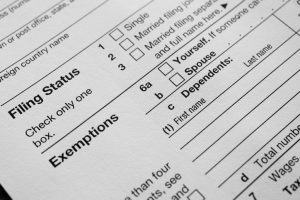Do you remember that last year (in 2017) Congress passed the largest piece of tax reform legislation in more than three decades?
For couples who are separating or divorcing AND who have either high- or low-value assets, the changes are likely to affect your returns for tax year 2018 (the one you’ll file in 2019). If you are divorcing, you may want to know: “Who gets to claim the Dependent Child Benefit?” Ask the Family Lawyers at Townsend, Tomaio & Newmark. (The answer is “Nobody!!”; they can explain why.)
For questions about divorce and filing tax returns in Hackensack, Ridgewood, Paramus, Teaneck, and Fort Lee contact our family lawyers at Townsend, Tomaio & Newmark. We have guided clients on hundreds of diverse property and financial issues, both relatively simple and complex. We can help you. 201-397-1750

We’ll tell you the ending of this tax story ends first. Essentially, the child deduction benefit that divorced parents often fight over in equitable distribution divorces is eliminated. In this article, we’ll elaborate more on this and cover a few other ways that last year’s tax reform can affect your 2018 taxes that you’ll be filing in 2019, and even possibly your co-parenting agreement. In addition, we’ll give you the highlights on:
• Lower Tax Rates and Changed Income Ranges
• Tax Relief for Individuals and Families
• Eliminations or Reductions in Deductions
Divorce attorneys at Townsend, Tomaio & Newmark have a thorough & up-to-date understanding of divorce, custody issues, the new lower tax rates and changed income ranges
The new tax laws continue to have seven tax brackets, but now the percents and thresholds are different. Let the attorneys at Townsend, Tomaio and Newmark explain how the tax reform will be good for you. In the meantime, we’ve summarized the technical information shared by Turbo Tax:
Increased standard deduction

A major change is that the standard deduction amount is almost doubled for all filers. Single taxpayers will see their standard deductions jump from last year’s (2017) $6,350 to $12,000 for 2018 taxes (the ones you file in 2019). Married couples filing jointly can expect to see an increase from $12,700 last year to $24,000 for 2018 taxes. It is expected that these increases will eliminate the need to itemize for many people.
Increased Child Tax Credit
The good news in New Jersey doesn’t stop there! Paramus NJ family lawyers can explain these 4 benefits:
• The Child Tax Credit is now double from the previous $1,000 per child to $2,000 for your 2018 tax return.
• Next, the refundable amount allowed is now $1,400 ($300 more since last year).
• The new laws allow for a non-refundable credit of $500 for dependents (other than children) which will give a little break for people who are caring for older parents or people who do not qualify as dependent children.
• Lastly, the income threshold at which these benefits phase out is raised from $110,000 for a married couple to $400,000. More people can qualify!
Ridgewood family lawyers discuss elimination or reduction of some deductions
We hope that this good news helps you to prepare your return. Here are a couple more changes to be aware of:
State and local taxes/Home mortgages:
There is a limit of $10,000 for the total amount of state and local property, income, and sales taxes that can be deducted. (Previously, these taxes have generally been fully tax deductible without limits.)
Likewise, under the new tax reforms, there is a limit to the amount of mortgage indebtedness ($750,000, down from $1,000,000 previously) on which interest can be deducted for new home purchases.
Health care:
There are two things here:
- First, there is no longer a tax penalty for not having health insurance after December 31, 2018.
- Second, more medical expenses can be deducted. Essentially, there is a lower floor above which out-of-pocket medical expenses can be deducted. In other words, the current law floor of 10% (for 2017 tax year) is lowered to 7.5% in tax year 2018. This means that you can deduct medical expenses that are more than 7.5% of your adjusted gross income.
Get your maximum refund: Contact Bergen County Family Lawyers to explain new laws & good news about the Standard Deduction & Child Tax Credit

The family law and tax attorneys of Townsend, Tomaio & Newmark have broad experience guiding clients through the many divorce settlement issues in Bergen County, Ridgewood, Hackensack, Paramus, Fort Lee, Teaneck, and across all of Northern New Jersey. Our legal team believes in taking the time to understand your family’s circumstances and concerns. If you want top quality legal solutions and to be kept informed and involved during the divorce process, we are the law firm for you.